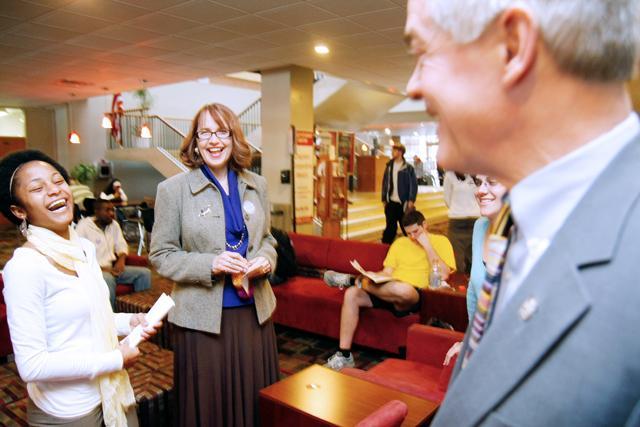After President Barrack Obama declared Jan. to be Stalking Awareness Month, N.C. State followed suit with a ceremony Thursday in Talley.
The Women’s Center sponsored the event since they offer assistance to students dealing with stalking issues. Thomas Stafford, vice-chancellor of student affairs, spoke to the group of students and University employees that attended the ceremony.
May Chung, a senior in English education and program assistant for The Movement, is the Stalking Awareness Month coordinator. Chung said The Women’s Center and The Movement wanted to bring attention to stalking.
“Dr. Stafford spoke about the severity of stalking,” Chung said. “Stalking is the least recognized of the different types of domestic violence.”
The group especially wanted to bring attention to cyber-stalking, especially after the incidences at Louisiana State, Auburn and Florida State; and according to Chung, different universities have recently had problems with sorority pledges being cyber-stalked.
Juliette Grimmett, assistant director of interpersonal violence services, said stalking is difficult to define.
“Stalking can best be described as terrifying,” Grimmett said. “Stalking doesn’t equal love. It’s scary.”
To better explain stalking, Grimmett shared a hypothetical story with the group.
“Imagine having broken up with your intimate partner, having gone off to school, bought a new car, got a new job, and you walk out of your psychology class one day and they are standing there,” Grimmett said.
According to Grimmett, the more humorous stalking is made to sound, the less people will report it.
“Every time we make stalking more humorous, we minimize the severity,” Grimmett said. “The terms society has to talk about stalking make it worse. ‘He’s stalking you,’ ‘she’s stalking you,’ and ‘Facebook stalking.’ These all make stalking humorous.”
According to Grimmett, the average duration of a stalking is 1.8 years. However, if the victim knows the stalker, the average duration is increased to 2.2 years.
National Crime Statistics show that one in six women are stalked and 1 in 45 men are stalked.
Stalking often escalates into violence, according to Grimmett.
“Stalking is serious,” Grimmett said. “If you have a funny feeling, you should listen to it.”
Stafford spoke to the crowd about the lack of public conversation about such a severe issue.
“I hope all of us will leave here with a better understanding of the problem,” Stafford said. “We need to help communicate that stalking is a serious problem.”
According to Stafford, stalking happens all the time, and yet the public is often reluctant to face the facts about the issue.
“Everyone needs to have a full and complete understanding of the significance of stalking,” Stafford said.
Stafford said he had three objectives he wanted to encourage the campus community to follow.
“We need to get the word out about stalking and how serious it is,” Stafford said. “We also must encourage victims of stalking to report it, and then take an appropriate and stern action to people who stalk.”
Stafford said he wanted to thank Student Affairs, Multicultural Student Affairs, and GLBT Center for the help in getting the word out about stalking.
“I especially want to thank the students who are here,” Stafford said. “When you speak out, you have more impact that anyone.”








